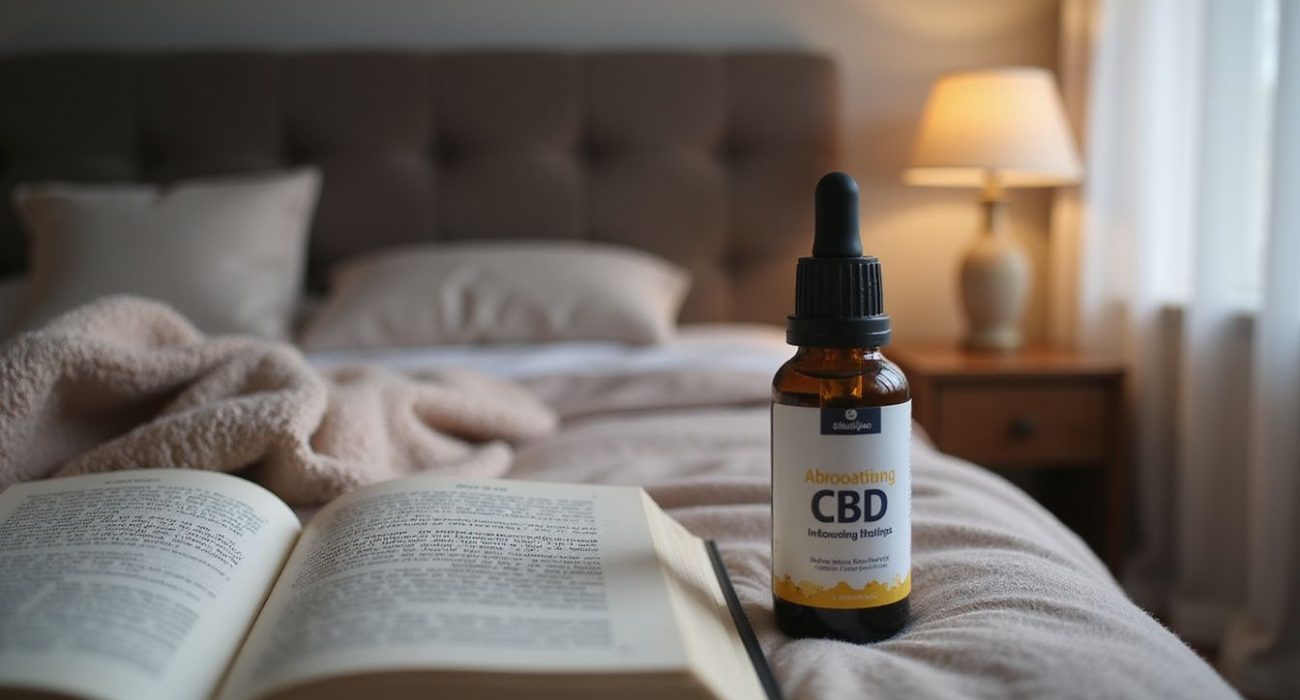Many people struggle to get good sleep at night. CBD, a compound from the cannabis plant, has become a popular choice for improving sleep. In this post, we’ll explore how CBD for sleep might help those facing restless nights find relief.
Keep reading to learn more!
How Does CBD Work for Sleep?
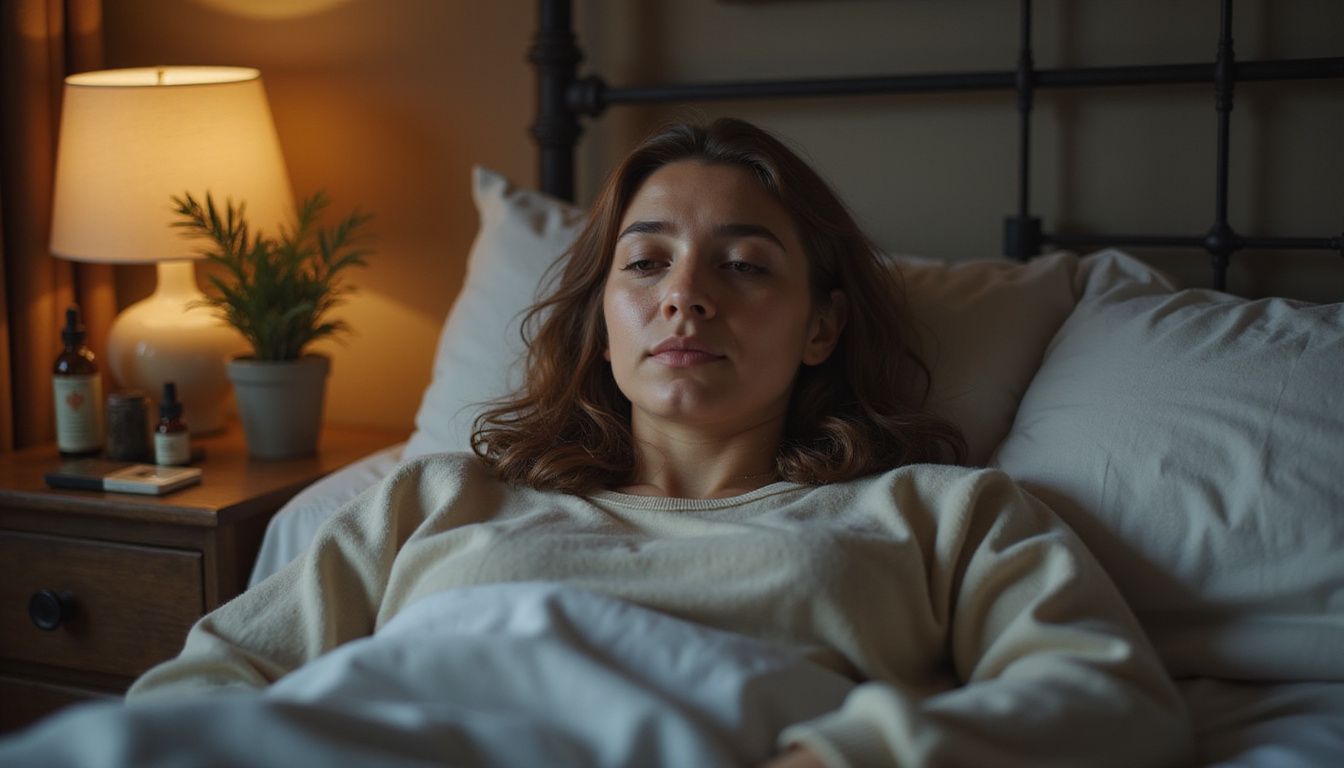
CBD interacts with the endocannabinoid system in our bodies, which helps regulate various functions including sleep-wake cycles. It shows potential in reducing anxiety and stress, easing insomnia symptoms, and managing chronic pain to promote better sleep quality.
Interaction with the Endocannabinoid System
The endocannabinoid system (ECS) plays a big role in the body. It helps control pain, emotions, and how well we sleep. Cannabidiol (CBD) works with this system to affect these areas.
The ECS has special spots called cannabinoid receptors on cells throughout the body. CBD links up with these spots, which can change how you feel and sleep.
CBD does not make you feel high like THC does. Instead, it supports the ECS in keeping things balanced in your body. This balance is key for good sleep, less stress, and controlling pain.
When CBD strengthens the ECS’s actions, it might help fix sleep problems and improve rest quality.
Regulation of Sleep-Wake Cycles
CBD’s interaction with the body’s endocannabinoid system leads to changes in sleep-wake cycles. This system plays a key role in maintaining many bodily functions, including sleep. CBD helps regulate these cycles, making it easier for people to fall asleep and stay asleep.
CBD affects the serotonin system, calming the nervous system.
This calmness can lead to better sleep quality for those with difficulty falling asleep or staying asleep. By regulating sleep patterns, CBD offers potential relief for those suffering from insufficient sleep or various sleep disturbances.
Potential Benefits of CBD for Sleep
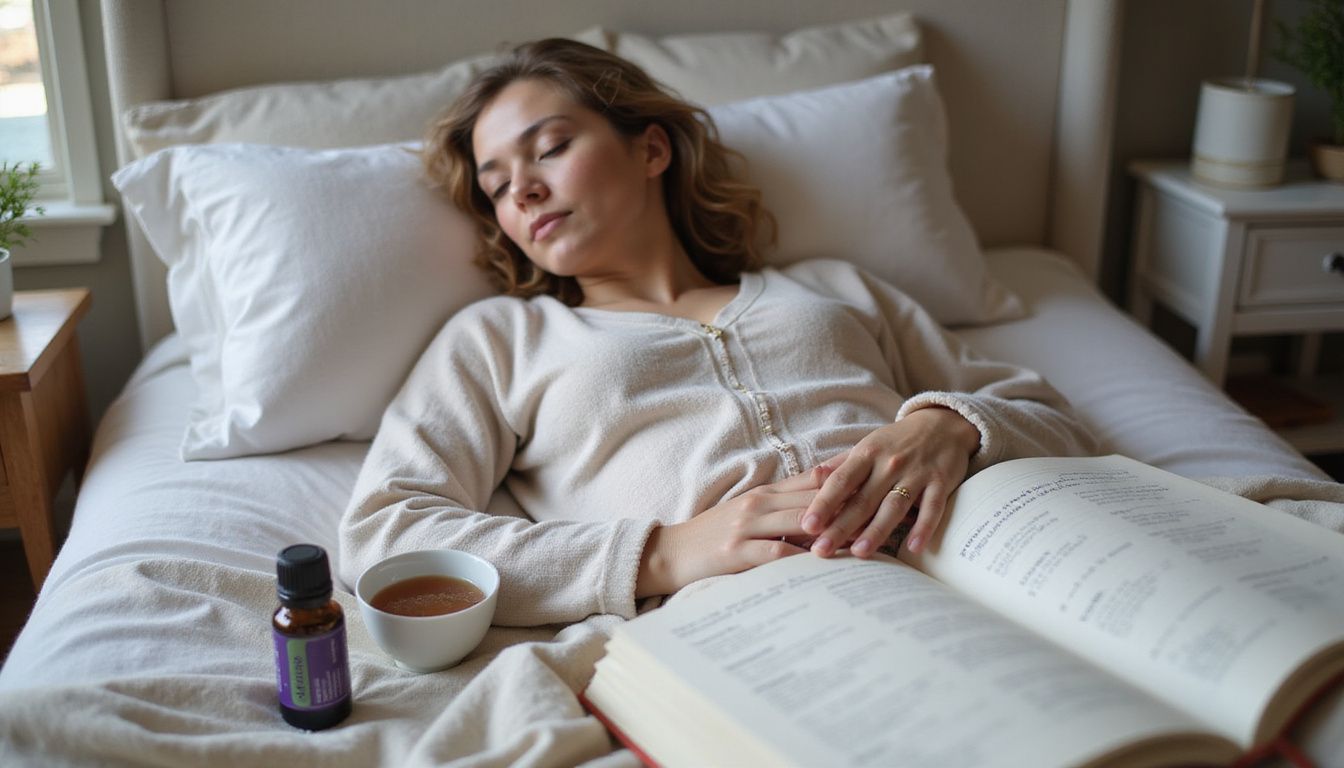
CBD exhibits potential in enhancing sleep by diminishing anxiety and stress, easing insomnia symptoms, and addressing chronic pain. Research indicates that CBD might have a favorable effect on sleep quality and overall mental and physical well-being.
Reducing Anxiety and Stress
CBD can help people feel less anxious and stressed. A study in 2019 found that 80% of participants felt their anxiety drop after one month of using CBD. This improvement may help them sleep better, especially if they have trouble sleeping because of feeling anxious.
Since CBD tackles both pain and anxiety issues, it is useful for those who cannot sleep well due to these problems. Using CBD might make it easier for them to fall asleep and stay asleep throughout the night.
This makes CBD a helpful choice for improving sleep by lowering stress and worry.
Alleviating Insomnia Symptoms
After lowering anxiety and stress, CBD might help people with sleep problems. Insomnia makes it hard for millions of adults in the U.S. to get good rest. This problem often comes from feeling anxious or having long-lasting pain.
CBD may improve how well someone sleeps by dealing with these causes. For those who find it hard to fall asleep or stay asleep because of discomfort or worry, using CBD could offer some relief.
A poll by Forbes Health showed that 62% of middle-aged adults turn to CBD for easing pain, which is closely linked to better sleep quality for many.
Managing Chronic Pain
CBD shows promise in managing chronic pain. This benefit helps people who suffer from conditions that cause long-lasting discomfort. By reducing inflammation and interacting with neurotransmitters, CBD can lessen the pain people feel.
For many, this means they can do their daily activities with less pain.
Healthy college students taking 50 mg of CBD daily reported improved sleep.
This finding is important because good sleep can help manage chronic pain too. Better rest at night makes it easier for the body to heal and cope with discomfort during the day.
Next, we look into what research says about CBD and sleep.
What Does the Research Say About CBD and Sleep?
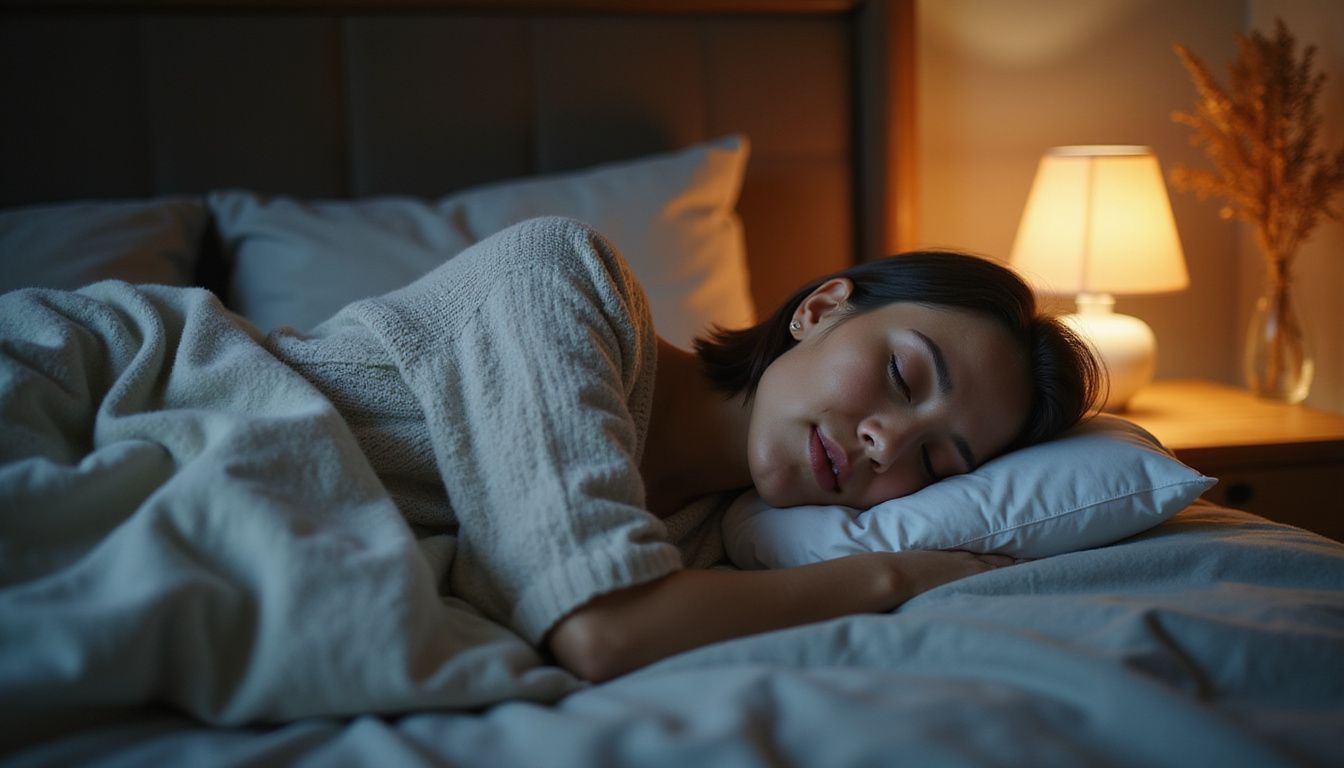
CBD has gained attention for its potential to improve sleep. Studies on CBD alone and in combination with THC have shown promising results. Research suggests that CBD may help reduce anxiety, alleviate insomnia symptoms, and manage chronic pain, leading to improved sleep quality.
Studies on CBD Alone for Sleep
Research on CBD and its effects on sleep have shown varied results. Some studies show promise for using CBD to improve sleep in people.
- People can take up to 300 mg of CBD daily for six months safely.
- Clinical trials give mixed results on how well CBD works to help healthy people sleep better.
- A study found that CBD might help people fall asleep faster and stay asleep longer.
- Another research highlighted that high doses of CBD may aid those with sleep troubles due to anxiety or stress.
- However, low doses of CBD may not affect sleep patterns significantly in some individuals.
- Studies also show that the impact of CBD on sleep might depend on the person, their health status, and dosage used.
- Scientists keep looking into how exactly CBD interacts with the brain’s receptors that control the sleep-wake cycle.
- Most research agrees more studies are needed to understand the best way to use CBD for sleep disorders fully.
Each point brings out a slice of ongoing research into how CBD could be a useful tool for improving restful nights for various people across different walks of life.
Studies on CBD with THC for Sleep
Some studies focus on how CBD combined with THC affects sleep. These studies examine the impact of both compounds found in cannabis plants.
- Research shows that using CBD with THC can improve sleep for some people. This is because THC has psychoactive effects, while CBD does not.
- A study found that a mix of CBD and THC could help people with severe insomnia. Patients reported sleeping better.
- Another research mentioned that cannabinoids like CBD and THC work together. They call this the “entourage effect.” It might make these compounds more effective for sleep.
- Scientists have noticed that low doses of THC seem to help with falling asleep faster. But, high doses may hurt sleep quality over time.
- People with chronic pain often find it hard to sleep. Studies suggest that CBD and THC together can reduce pain at night. This helps them sleep better.
- Anxiety and stress can make it tough to sleep well. Some research says CBD and THC can calm the mind, leading to better rest.
- Not all findings are clear, though. Some studies point out that results can vary widely among different users.
- Safety is key when using THC and CBD for sleep. High amounts of THC could lead to unwanted side effects like feeling too high or having a fast heart rate.
- Experts agree more research is needed. They want to understand how CBD and THC affect sleep in the long term.
Best Forms of CBD for Sleep
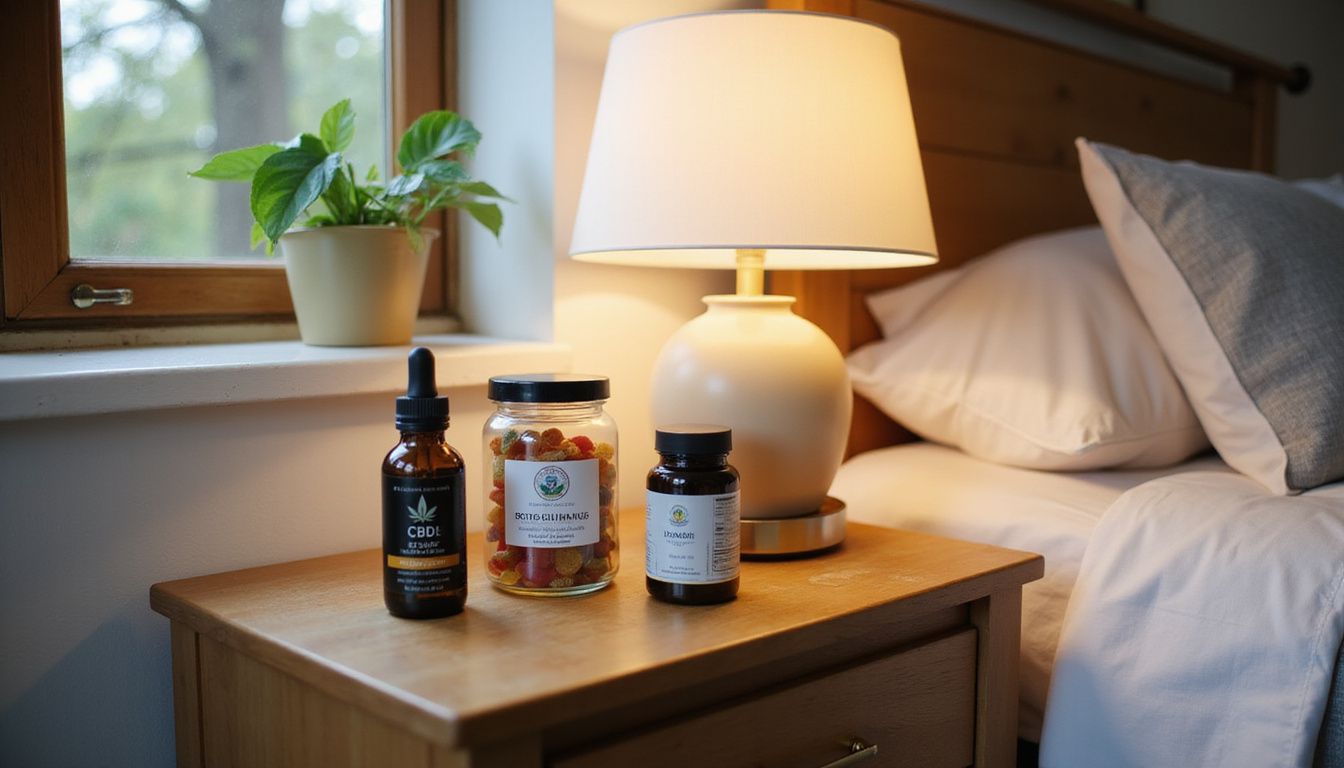
1. CBD Oil.
2. CBD Gummies.
3. Capsules and Pills.
CBD Oil
CBD oil is a popular form for improving sleep. You take it by putting drops under your tongue. The Sweet Sleep CBD Oil has 25 mg of CBD in just 1 ml. This makes it easy to use the right amount for better rest.
For sublingual use, take CBD oil 15 to 30 minutes before bed.
This allows your body time to absorb the CBD fully. It helps manage sleep cycles without needing pills or chemicals. Many find this natural option offers relief from insomnia and stress, making good sleep easier to achieve.
CBD Gummies
CBD gummies are a popular choice for sleep. They mix CBD and other ingredients to help you rest. Some gummies have 25 mg of CBD and CBN per piece. Others include 22.5 mg CBD, 2.5 mg CBN, and 5 mg Melatonin each.
These blends aim to improve sleep quality by calming the mind and managing sleep cycles.
People choose these edibles because they’re easy to use and taste good. You know how much CBD you get in each gummy, which makes dosing simple. For those looking for natural sleep aids without strong side effects, CBD gummies might be worth trying.
Capsules and Pills
Sweet Sleep CBD Capsules contain 25 mg of CBD in each capsule. Meanwhile, Green Roads offers CBD Gummies for Sleep with options including 750 mg (30 ct) and 250 mg (10 ct). These products provide a convenient way to consume CBD for sleep support.
They are easy to use and offer precise dosing, making them suitable for individuals seeking an alternative form of taking CBD as opposed to oils or edibles.
When exploring the potential benefits of various forms of consuming CBD, capsules and pills offer a discreet and familiar method for those already accustomed to traditional supplements.
Now let’s delve into optimal ways to use CBD for better sleep.
– How to Use CBD for Better Sleep
How to Use CBD for Better Sleep
To use CBD for better sleep, start with a low dosage and gradually increase it. Take CBD about an hour before bedtime. For more information on using CBD for improving your sleep quality, continue reading our blog on the potential of CBD for sleep.
Optimal Dosage Recommendations
To ensure safe and effective use of CBD for better sleep, consider the following optimal dosage recommendations:
- Start with a low dose and gradually increase to find the most effective amount.
- Research indicates high doses of 1.5 grams per day are well-tolerated in studies.
Best Time to Take CBD for Sleep
When determining the best time to take CBD for better sleep, it’s crucial to take into account the type of CBD product you are using. If you’re ingesting edibles or oils, it’s best to take them approximately an hour before bedtime.
This is because they take longer (1–2 hours) to take effect but also have a longer duration due to their slower absorption into the body. This delayed impact and extended duration can ensure that the calming and relaxing properties of CBD remain active throughout your sleep cycle.
Potential Risks and Side Effects of CBD
CBD may cause side effects such as fatigue and diarrhea. It’s crucial to be aware of these before using CBD for sleep. Read more about this in our blog.
Common Side Effects
CBD users can encounter side effects like diarrhea, nausea, drowsiness, low appetite, agitation, and irritability. However, it’s noteworthy that for most individuals, particularly during short-term usage or at lower doses, they are unlikely to experience any of these side effects.
Interactions with Medications
CBD can interact with medications, particularly those processed by the liver like statins and blood thinners. These interactions can impact the effectiveness and safety of both CBD and the medication being used.
Moreover, based on animal studies, there is potential for liver damage and male reproductive toxicity. Hence, it’s crucial to consult a healthcare professional before using CBD in conjunction with other medications to ensure safe usage.
Next heading: “Who Should Avoid CBD for Sleep?
Who Should Avoid CBD for Sleep?
Pregnant or breastfeeding individuals and people with certain medical conditions should avoid using CBD for sleep. To learn more, check out the full blog post!
Pregnant or Breastfeeding Individuals
Pregnant and breastfeeding women should avoid using CBD. Research shows no safe levels for them, due to potential harm to the baby during pregnancy or through breast milk. It’s important for pregnant and breastfeeding individuals to prioritize the health and well-being of their child.
CBD is not advisable for use by pregnant or breastfeeding individuals, as it may pose risks to the developing fetus or infant. The lack of comprehensive research into the effects of CBD on pregnancy and lactation warrants caution in its use among this population.
People with Certain Medical Conditions
Individuals with certain medical conditions should approach the use of CBD for sleep cautiously. Those taking blood thinners such as Warfarin must consult a doctor before using CBD due to potential side effects.
Additionally, people on specific medications should seek medical advice prior to using CBD, as interactions may occur. Pregnant or breastfeeding women are advised against using CBD because of the potential risks to infants.
It’s crucial to bear in mind that the FDA has not approved CBD products for any medical conditions, emphasizing the need for professional guidance in this realm. The dosing of CBD is not regulated by the FDA, which could lead to variations among products affecting individuals with medical conditions.
Some CBD products may contain undisclosed THC levels, which could be harmful to those with particular health issues.
When it comes to exploring alternative remedies…
Are There Alternative Remedies for Sleep?
Alternative Remedies for Sleep: Melatonin, Magnesium, Herbal Teas. For more details on these alternative remedies, read the complete blog!
Melatonin
Melatonin, a naturally occurring hormone in the body, regulates the sleep-wake cycle, also known as the circadian rhythm. Utilizing melatonin supplements can aid in enhancing sleep quality and addressing issues like jet lag or shift work sleep disorder.
Notably, studies indicate that when paired with melatonin, CBD could potentially enhance sleep quality. For example, CBD gummies for sleep contain 5 mg of melatonin per gummy.
Individuals often turn to melatonin to alleviate symptoms of insomnia, frequently stemming from anxiety or stress. Additionally, it can serve as an effective solution for managing sleep disorders and promoting comprehensive sleep patterns.
While the effectiveness may differ for each individual, combining melatonin with other natural remedies such as CBD might yield improved outcomes in optimizing one’s rest quality.
Magnesium
Magnesium, a vital mineral, takes part in over 300 enzymatic functions in the body. It has been associated with enhancing sleep quality through the regulation of neurotransmitters and melatonin production.
Research has indicated that a lack of magnesium can result in diminished sleep quality, emphasizing its significance for overall health. Including magnesium-rich foods like nuts, seeds, and leafy greens in your diet can aid in promoting better sleep.
Furthermore, certain studies propose that using a magnesium supplement might help alleviate symptoms of insomnia and induce relaxation. Nonetheless, it’s advisable to seek advice from a healthcare professional before initiating any new supplements to establish the proper dosage and guarantee that it does not conflict with existing medications or conditions.
Overall, maintaining adequate magnesium levels through diet and potential supplementation could be advantageous for improving sleep quality and supporting overall well-being.
Herbal Teas
Herbal teas are a natural remedy for promoting better sleep. They can be part of good sleep hygiene practices. Some herbal teas promote relaxation and support sleep quality. Chamomile, valerian root, and lavender are commonly used herbs in teas for sleep.
Consulting with healthcare providers is essential to identify suitable herbal tea options for addressing sleep issues.
Conclusion
In conclusion, CBD exhibits potential to enhance sleep quality, particularly for individuals managing anxiety, chronic pain, or other health issues. Studies indicate that CBD interacts with the endocannabinoid system to regulate sleep patterns and emotions.
While consulting a healthcare professional before using CBD is advisable, its potential advantages for sleep and overall well-being are worth exploring. When seeking CBD options for better sleep, conscientiously choosing high-quality products from reputable sources is essential for safety and efficacy.
With ongoing research and increasing interest in natural remedies like CBD, it is crucial to remain informed about its potential advantages and risks when contemplating it as part of a comprehensive strategy towards improved sleep health.

